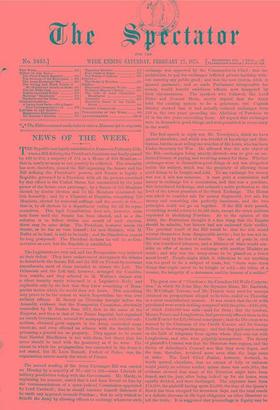The great case of "Chariton v. the Canadian Oil Wells
Corpora- tion," in which Sir John Hay, Sir Seymour Blane, Mr. Eastwick, Mr. 1I.Ciillsgh Torreus, and Mr. Francis were sued for moneys obtained on prospectuses alleged to be false, ended on Thursday in a most unsatisfactory manner. It was shown that the oil wells purchased were worth nothing compared with the price—£480,000, of which £160,000 was cash—paid for them ; that the vendors, Messrs. Prince and Longbottom, had previously offered them to the Credit Foncier for 125,000 and some paper; that the Directors were warned by the Chairman of the Credit Foncier and Sir George Balfour in the strongest language ; and that they paid much money on the faith of telegrams from agents whom they sent out with Longbottom, and who were palpably incompetent. The theory of plaintiff's Counsel was that the Directors were rogues, and the theory of defendant's Counsel was that they were dupes, and the case, therefore, involved more even than the large sums at stake. The Lord Chief Justice, however, declared, in words quoted elsewhere, that no extent of folly or rashness would justify an adverse verdict, unless there was mala fides, the evidence showed that some of the Directors might have been duped, and the jury, after being locked up for six hours, were equally divided, and were discharged. The expenses have been £12,000, the plaintiff having spent £5,000, the time of the Queen's Bench has been occupied for seventeen days, and the total result is a definite decrease in the legal obligation on other Directors to tell the truth. It is suggested that proceedings in Equity may be
taken, but it is scarcely in human nature to incur all that trouble and expense twice over merely to obtain a chalice of inadequate compensation.



































